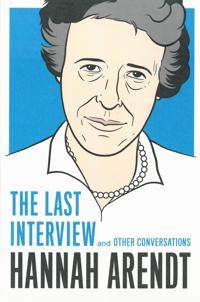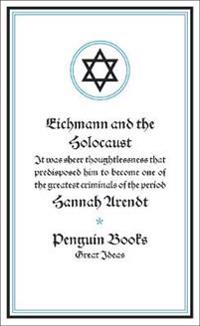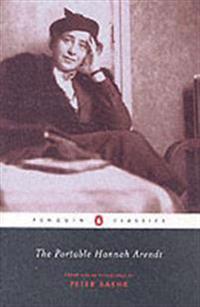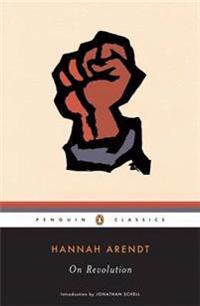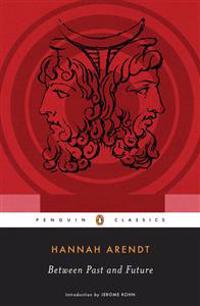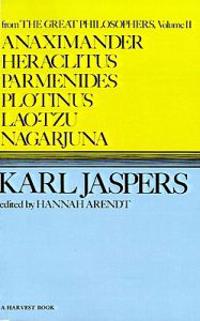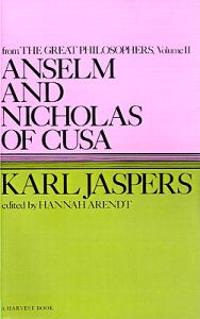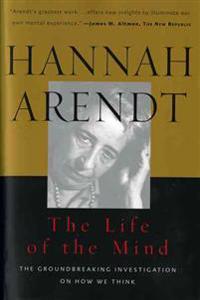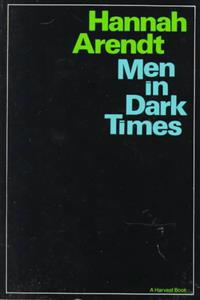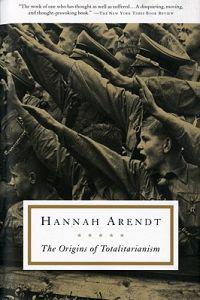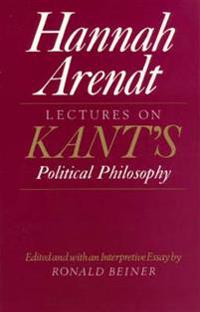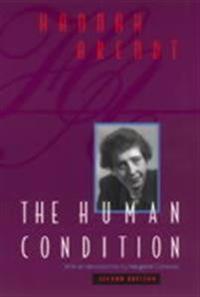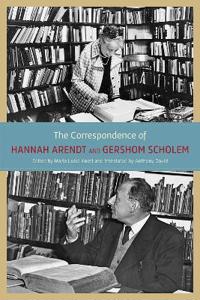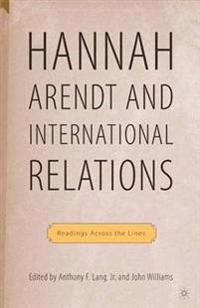Antisemitism: Part One of the Origins of Totalitarianism (Häftad)
avHannah Arendt, Hannah Arendt
ISBN: 9780156078108 - UTGIVEN: 196803The first volume of Arendt's celebrated three-part study of the philosophical origins of the totalitarian mind. This volume focuses on the rise of antisemitism in Europe in the late nineteenth and early twentieth centuries. Index.
[...]Eichmann and the Holocaust (Pocket)
avHannah Arendt
ISBN: 9780141024004 - UTGIVEN: 200508Throughout history, some books have changed the world. They have transformed the way we see ourselves - and each other. They have inspired debate, dissent, war and revolution. They have enlightened, outraged, provoked and comforted. They have enriched lives - and destroyed them. Now Penguin brings y[...]
The Portable Hannah Arendt (Häftad)
avPeter Baehr
ISBN: 9780142437568 - UTGIVEN: 200309Although Hannah Arendt is considered one of the major contributors to social and political thought in the twentieth century, this is the first general anthology of her writings. This volume includes selections from her major works, including "The Origins of Totalitarianism", "Between Past and Future[...]
Eichmann in Jerusalem (Storpocket)
avHannah Arendt
ISBN: 9780143039884 - UTGIVEN: 200612Hannah Arendt's portrayal of the terrible consequences of blind obedience, "Eichmann in Jerusalem: A Report on the Banality of Evil" contains an introduction by Amos Elon in "Penguin Classics". Sparking a flurry of heated debate, Hannah Arendt's authoritative and stunning report on the trial of Germ[...]
On Revolution (Storpocket)
avHannah Arendt
ISBN: 9780143039907 - UTGIVEN: 200803Tracing the gradual evolution of revolutions, Arendt predicts the changing relationship between war and revolution and the crucial role such combustive movements will play in the future of international relations. She looks at the principles which underlie all revolutions, starting with the first gr[...]
Between Past and Future: Eight Exercises in Political Thought (Häftad)
avHannah Arendt, Jerome Kohn
ISBN: 9780143104810 - UTGIVEN: 200610Arendt describes the loss of meaning of the traditional key words of politics: justice, reason, responsibility, virtue, glory. Through a series of eight exercises, she shows how we can redistill once more the vital essence of these concepts.
[...]Anaximander, Heraclitus, Parmenides, Plotinus, Lao-Tzu, Nagarjuna (Häftad)
avKarl Jaspers, Hannah Arendt
ISBN: 9780156075008 - UTGIVEN: 1974-10Taken from the Great Philosphers, Volume II.
Anselm and Nicholas of Cusa (Häftad)
avKarl Jaspers, Ralph Jaspers, Hannah Arendt
ISBN: 9780156076005 - UTGIVEN: 1974-10Taken from the Great Philosphers, Volume II.
Crises of the Republic: Lying in Politics; Civil Disobedience; On Violence; Thoughts on Politics and Revolution (Häftad)
avHannah Arendt
ISBN: 9780156232005 - UTGIVEN: 197205Imperialism (Häftad)
avHannah Arendt
ISBN: 9780156442008 - UTGIVEN: 196803Explores the roots of totalitarianism and its culmination in Nazi Germany and Stalinist Russia
Life of the Mind: One/Thinking, Two/Willing (Häftad)
avHannah Arendt
ISBN: 9780156519922 - UTGIVEN: 198103Discusses the nature of thought and volition, examines past philosophical theories, and clarifies the relation between will and freedom[...]
Men in Dark Times (Häftad)
avHannah Arendt
ISBN: 9780156588904 - UTGIVEN: 197003Collection of essays which present portraits of individuals ranging from Rosa Luxemburg to Pope John XXIII who the author believes have illuminated "dark times"[...]
On Violence (Pocket)
avHannah Arendt
ISBN: 9780156695008 - UTGIVEN: 197003An analysis of the nature, causes, and significance of violence in the second half of the twentieth century. Arendt also reexamines the relationship between war, politics, violence, and power. "Incisive, deeply probing, written with clarity and grace, it provides an ideal framework for understanding[...]
The Origins of Totalitarianism (Häftad)
avHannah Arendt
ISBN: 9780156701532 - UTGIVEN: 197303Hannah Arendt's definitive work on totalitarianism and an essential component of any study of twentieth-century political history "The Origins of Totalitarianism" begins with the rise of anti-Semitism in central and western Europe in the 1800s and continues with an examination of European colonial i[...]
Spinoza (Häftad)
avKarl Jaspers, Hannah Arendt
ISBN: 9780156847308 - UTGIVEN: 197410Taken from the Great Philosphers, Volume II.
Between War and Politics: International Relations and the Thought of Hannah Arendt (Inbunden)
avPatricia Owens
ISBN: 9780199299362 - UTGIVEN: 2007-08-30Lectures on Kant's Political Philosophy (Häftad)
avHannah Arendt, Ronald S. Beiner
ISBN: 9780226025957 - UTGIVEN: 198909Love and Saint Augustine (Pocket)
avHannah Arendt, Joanna Vecchiarelli Scott, Judith Chelius Stark
ISBN: 9780226025971 - UTGIVEN: 199805Hannah Arendt began her scholarly career with an exploration of Saint Augustine's concept of caritas, or neighborly love, written under the direction of Karl Jaspers and the influence of Martin Heidegger. After her German academic life came to a halt in 1933, Arendt carried her dissertation into exi[...]
The Human Condition (Pocket)
avHannah Arendt
ISBN: 9780226025988 - UTGIVEN: 199812In this text, Hannah Arendt considers humankind from the perspective of the actions of which it is capable. The problems are identified as diminishing human agency and political freedom - the paradox that as human powers increase through technological and humanistic inquiry, we are less equipped to [...]
The Correspondence of Hannah Arendt and Gershom Scholem
ISBN: 9780226924519 - UTGIVEN: 2017-11Few people thought as deeply or incisively about Germany, Jewish identity, and the Holocaust as Hannah Arendt and Gershom Scholem. And, as this landmark volume reveals, much of that thinking was developed in dialogue, through more than two decades of correspondence. Arendt and Scholem met in 1932 in[...]
Hannah Arendt and International Relations (Häftad)
avAnthony F. Lang Jr.
ISBN: 9780230606135 - UTGIVEN: 2008-10Arendt's approach to politics focuses on action and conduct, rather than institutions, constitutions, and states. In light of Arendtian conceptions of politics, essays in this book challenge conventional IR theories. The contributions on agency explore concepts and categories of political action tha[...]
Hannah Arendt (Häftad)
avJulia Kristeva
ISBN: 9780231121033 - UTGIVEN: 200306Twenty-five years after her death, we are still coming to terms with the controversial figure of Hannah Arendt. Interlacing the life and work of this seminal twentieth-century philosopher, Julia Kristeva provides us with an elegant, sophisticated biography brimming with historical and philosophical [...]

